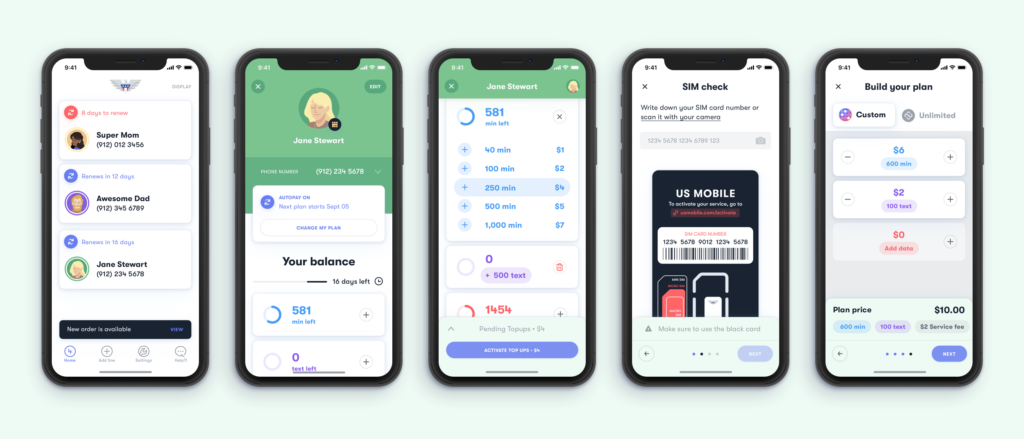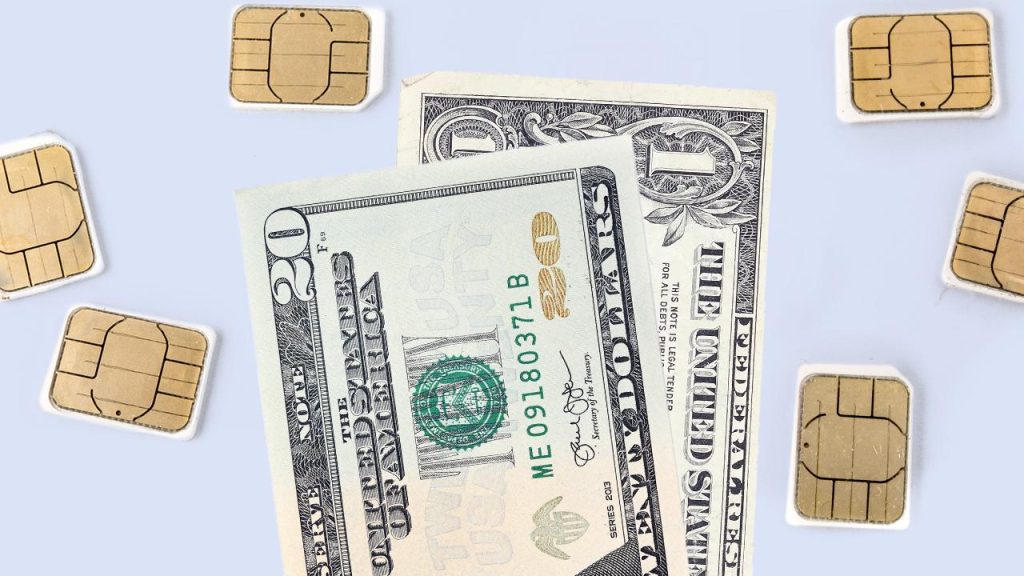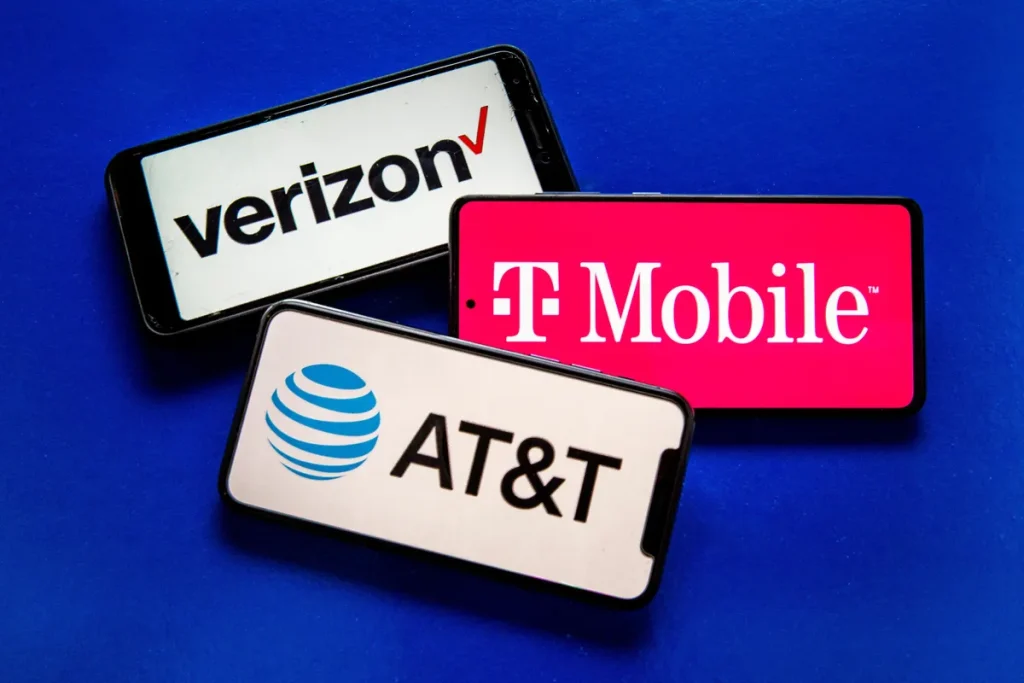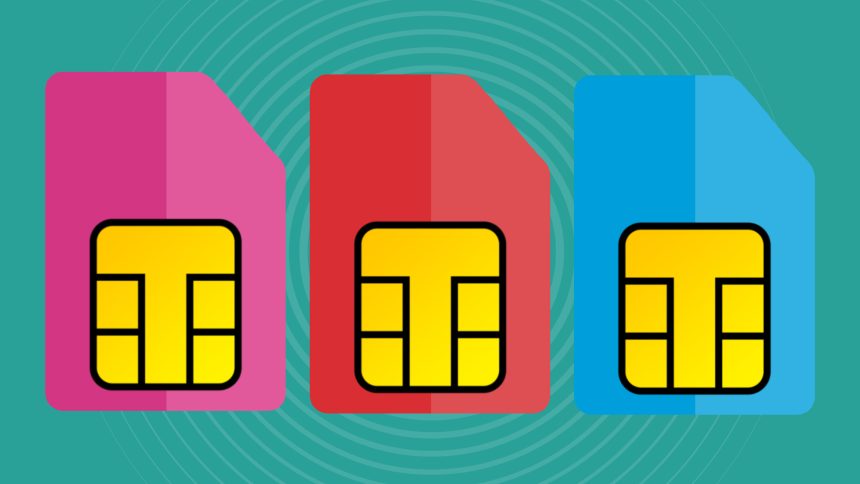Are you busy with your visa and packing now? Don’t forget one important thing – apply for a U.S. phone card. US phone card processing is something different with domestic one. In order to avoid the first time to the United States, the study life is not familiar with everywhere bumping into walls. Today, uhomes will take you to understand the U.S. Mobile Plans.

U.S. Mobile Plans Operators
- National Operators in the United States:
There are four in total, AT&T, T-Mobile, Verizon and Sprint. Their networks are stable, with good coverage and relatively fast rates. However, Verizon and Sprint use CDMA system and the card is not separated. Thus, for most people, they can choose AT&T or T-Mobile. Their network coverage and speed cannot be compared with that of virtual carriers, and whose native cards can be used as hotspots. - Local operators: There are a lot of local operators, such as US cellular, LEAP, and so on.
- Virtual Operators: A virtual operator is one that does not build its own network. However, wholesales some numbers from big operators and sells them to customers under its own brand name. This is a very common phenomenon. The common virtual operators in the U.S. include H2O, Lyca, Red Pocket, Ultra, Spot, Simple, and so on. The cards purchased online that don’t specify AT&T, T-Mobile native cards or have other company names written on them or are cheaper are basically virtual operators cards).
U.S. Mobile Plans Options
Packages from the four major operators – Verizon Wireless, AT&T Mobility, T-Mobile USA and Sprint Nextel . They provide Prepaid Plans, Individual Plans, Family Plans and Monthly Plans.
Prepaid Plan
The so-called prepaid plan means that you don’t have to sign a contract. And you don’t have to make a deposit, you just have to pay as much as you want. The package is very similar to the domestic phone package. And you must ensure that you have money in your account before you can make a call. Also, the phone bill must be recharged in advance. The advantage is that you do not have to fill out an agreement with the telecommunications company.
Phone text message students for 50 dollars unlimited package is more cost-effective. Another plan is students can use 25 dollars monthly package. It inculde text messages are free of charge, including 250 minutes of phone calls, over the words can be charged at 10 cents / minute. If you want to surf the Internet, you have to pack another Data Plan.There are 5-dollar (50M), 15-dollar (200M), and 25-dollar (1G). But it is not mandatory, so most of the prepaid packages are not available. Most of the students who use Prepaid don’t have Data Plan, so they can’t access the internet. This is another disadvantage of Prepaid.
Monthly Plan
It’s just that you don’t have to sign up. And you don’t have to put down a deposit, and you pay a certain amount of money every month. It’s easier to stop the plan when you want. For example: T-mobile’s FlexPay, $49.99/month for 600 minutes, free on weekends and nights.

Individual Plan and Family Plan
- Individual Plan Package: It is to sign up with the operators. If you don’t have SSN (Social Security Number), you have to pay a deposit, which is usually 500 dollars. However, due to the high deposit of the individual plan, students and families usually do not choose this plan.
- Family Plan Package: 2 to 5 people share a contracted package. And the money paid is shared equally by all, the time inside the package is shared equally by all. As long as one of them has SSN, no deposit is required, otherwise everyone needs to pay a deposit.
There are a few things to note about the individual and family packages: you don’t need to buy your own cell phone for these two packages. Calls on weekends, holidays, and evenings are no charge for most packages, and evenings are generally defined as 9 p.m. to 6 a.m. AT&T calls to AT&T’s cell phones are no charge at any time. Bonus billable hours are the number of minutes you can call for free between 6 a.m. and 9 p.m. If you go over, the cost is very expensive. There is a $36 activation fee for the first time you activate it for use.
Comparison of Four Major Operators

1. U.S. Mobile Plans operator- Verizon Wireless
Verizon Wireless is the largest wireless communications service provider in the United States and a leading global broadband and telecommunications provider. The guaranteed signal quality also makes it more expensive, as there are no texting packages, so you have to pay extra for sending and receiving text messages.
Pros: Good signal quality, wide coverage, available in the wild.
Disadvantages:
Expensive as it uses the CDMA system; only sells long-term contracts, no short-term prepaid cards.
2. U.S. Mobile Plans operator-AT&T
AT&T is the largest fixed-line telephone service provider. And is the first cell phone service provider in the United States. In addition to providing broadband and pay TV services. AT&T is also the second largest operator in the United States. Thus, it goes without saying that GSM signals and relatively low prices. It has become the first choice of the majority of international students. However, the data is too small and there is no SMS package is still a problem. AT&T also need to pay extra fees to send and receive text messages. And it does not have a reminder of the amount of data usage, which is often easy to exceed.
Pros:
Reliable signal, wide coverage, fast internet speed; can use Google Maps to navigate, suitable for self-driving .
Disadvantages:
Slightly poor signal in the wild; low-speed unlimited traffic on AT&T, but no hotspot sharing.
3. U.S. Mobile Plans operator T-Mobile
T-Mobile is one of the major wireless communication service providers in the U.S. The main focus is on cheap packages, but the network quality is relatively average, if you live a little off the main road may not have a signal at home. However, the $10 unlimited international calling and texting monthly payment plan is still very attractive.
Pros:
Cost-effective and affordable; lots of high-speed data on the Internet and unlimited low-speed data.
Disadvantages:
Signal in town, poor signal in the wild.
4. U.S. Mobile Plans Operator-Sprint
- Sprint Corporation is a holding company that operates wireline and wireless communications in the United States, Puerto Rico, and the U.S. Virgin Islands. It is a global Internet backbone provider and the third largest long distance telephone company in the United States. It uses CDMA as well, and the rates are more cost-effective and attractive with unlimited text messages and data.
Tips for the U.S. Mobile Plans
- When choosing a package, please pay attention to the amount of high-speed data. High-speed data is the speed we really need. Some stores describe slow data as 3G, which is misleading, so please pay attention to it.
- When choosing a package, you need to pay attention to the length of your domestic’s calls, according to your actual needs to choose.
- Please pay attention to the product description when you buy, most of the merchants will be truthful description, if you especially need a certain function, such as whether it can be hotspot, need to display the real number of the United States and so on the request, please be sure to consult clearly, usually will provide accurate information to you.
- You can also choose to buy a phone card in Taobao in advance. You can activate the card in China, know the U.S. phone number in advance. After arriving in the U.S., it is convenient for domestic relatives and friends to contact you.
FAQ about U.S. Mobile plans
On average, students can expect to pay anywhere from $20 to $60 per month for an individual phone plan. But it also depending on the features and data included. Family plans, which may be more suitable for students sharing a plan with family members or roommates, can range from $40 to $100 or more per month for multiple lines.
International students in the USA can typically buy phone cards or prepaid SIM cards from a variety of locations, including: Mobile Carrier Stores, Electronic Stores like Best Buy, Walmart, Target, Convenience Stores such as 7-Eleven, CVS, Walgreens, and gas stations, Online Retailers like Amazon, eBay, and Local Mobile Shops.
When applying for a phone card, the necessity of having a US bank account may depend on the specific policies of the phone card provider.
Metro Mobility Manual: Mastering New York Transportation
New York's public transportation system is extremely well developed. Even if you…
Discover the Safest Neighborhoods for House Rent NYC
When international students come to a new environment, one of their first…










